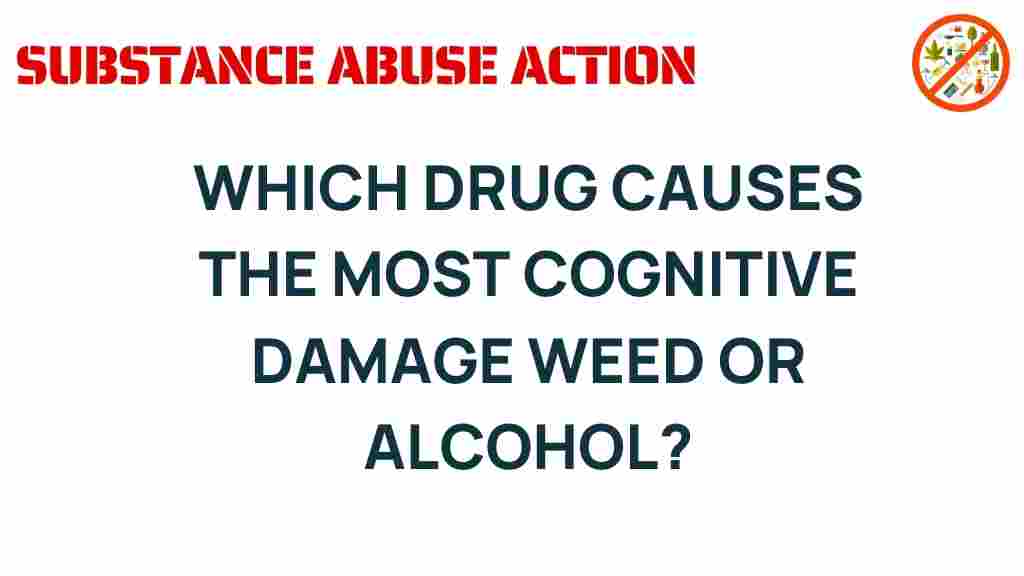Unraveling the Cognitive Dilemma: Weed vs. Alcohol and Cognitive Damage
The debate surrounding the cognitive effects of marijuana and alcohol has intensified in recent years, particularly as society becomes more aware of mental health and addiction issues. Both substances significantly impact brain function and mental health, yet they do so in fundamentally different ways. Understanding these differences is crucial for anyone considering their choices related to substance use.
The Basics of Weed and Alcohol
Before diving into the cognitive implications, it is essential to understand what marijuana and alcohol are, how they work, and their potential for addiction.
What is Marijuana?
Marijuana, or cannabis, is a plant that contains psychoactive compounds, primarily THC (tetrahydrocannabinol). It is often used recreationally and medicinally for its euphoric effects and potential health benefits.
What is Alcohol?
Alcohol is a legal psychoactive substance that is widely consumed worldwide. It acts as a depressant on the central nervous system, leading to various effects, including relaxation and impaired motor function.
Cognitive Damage: A Closer Look
Both marijuana and alcohol have been shown to have cognitive effects that can lead to cognitive damage. However, the extent and nature of this damage can vary significantly between the two substances.
Cognitive Damage from Marijuana
Research indicates that heavy, prolonged use of marijuana can lead to:
- Impaired Short-Term Memory: Users may find it difficult to remember recent events or learn new information.
- Altered Attention Span: Users may struggle to focus, especially in cognitively demanding tasks.
- Reduced Decision-Making Skills: Marijuana can impair judgment, leading to poor decision-making.
Cognitive Damage from Alcohol
Alcohol consumption, particularly in excessive amounts, is associated with:
- Long-Term Memory Loss: Chronic alcohol use can lead to difficulties in forming new memories.
- Impaired Cognitive Function: Alcohol can affect problem-solving abilities and critical thinking.
- Increased Risk of Dementia: Long-term alcohol abuse is linked to an increased risk of cognitive decline and dementia.
Comparison of Substance Effects on Brain Function
Understanding the effects of these two substances on brain function is critical for assessing their impact on mental health.
Neurotransmitter Interaction
Both marijuana and alcohol interact with neurotransmitters, but in different ways:
- Marijuana: Primarily affects the endocannabinoid system, influencing mood, memory, and appetite.
- Alcohol: Primarily affects GABA (gamma-aminobutyric acid), leading to sedation and relaxation, while also impacting dopamine pathways associated with pleasure.
Withdrawal and Recovery
Both substances can lead to addiction, and withdrawal can significantly affect mental health and cognitive function:
- Marijuana Withdrawal: Symptoms can include irritability, anxiety, and difficulty sleeping, which can exacerbate cognitive issues.
- Alcohol Withdrawal: This can be severe and include symptoms like tremors, seizures, and hallucinations, necessitating medical treatment.
Mental Health Implications
Both marijuana and alcohol can have profound implications for mental health.
Marijuana and Mental Health
There is a growing body of evidence suggesting that marijuana use is linked to:
- Increased Anxiety: While some use marijuana to alleviate anxiety, heavy use can often lead to heightened anxiety levels.
- Depression: Studies have shown a connection between heavy marijuana use and depressive symptoms.
Alcohol and Mental Health
Alcohol abuse is often linked to various mental health issues, including:
- Depression: Alcohol can exacerbate depressive symptoms, leading to a vicious cycle of increased consumption and worsening mental health.
- Anxiety Disorders: Alcohol is often used as a coping mechanism for anxiety, but it can worsen symptoms over time.
Addiction: The Risk Factors
Both marijuana and alcohol carry a risk of addiction, but the factors influencing addiction can differ.
Risk Factors for Marijuana Addiction
Some key factors include:
- Age of First Use: Early use can increase the likelihood of developing a dependence.
- Genetics: A family history of addiction may predispose individuals to marijuana dependence.
Risk Factors for Alcohol Addiction
Factors influencing alcohol addiction include:
- Family History: Genetics play a significant role in alcohol use disorders.
- Environmental Triggers: Social environment and accessibility can increase the risk of alcohol addiction.
Treatment and Recovery Options
Recovery from addiction to either substance requires a comprehensive approach that may include therapy, support groups, and sometimes medication.
Treatment for Marijuana Addiction
Effective treatment options include:
- Cognitive Behavioral Therapy (CBT): Helps individuals understand the triggers for their marijuana use and develop coping strategies.
- Support Groups: Groups like Marijuana Anonymous offer community support for those in recovery.
Treatment for Alcohol Addiction
Common treatment approaches include:
- Detoxification: A medically supervised detox can help manage withdrawal symptoms.
- Rehabilitation Programs: Inpatient or outpatient programs provide structured support for recovery.
For more in-depth information on addiction treatment options, check out this resource on addiction recovery.
How to Make Informed Choices
When considering the use of marijuana or alcohol, it is essential to weigh the potential cognitive damage and mental health implications. Here are some tips for making informed choices:
- Educate Yourself: Understand the effects of both substances on your cognitive function and mental health.
- Consider Your Mental Health: If you struggle with mental health issues, consult a professional before using these substances.
- Monitor Your Use: Be aware of how much and how often you consume these substances. Moderation is key.
Conclusion
In conclusion, both marijuana and alcohol present significant concerns regarding cognitive damage, mental health, and addiction. While they can play different roles in individuals’ lives, understanding their effects on brain function is paramount. Individuals must make informed choices, considering the potential risks and benefits. Recovery is possible with the right treatment and support, and those struggling with addiction should seek help. Remember, you are not alone in this journey, and resources are available to assist you.
For further reading on the effects of substances on mental health, you can check this external resource.
This article is in the category Addiction and created by SubstanceAbuseAction Team
